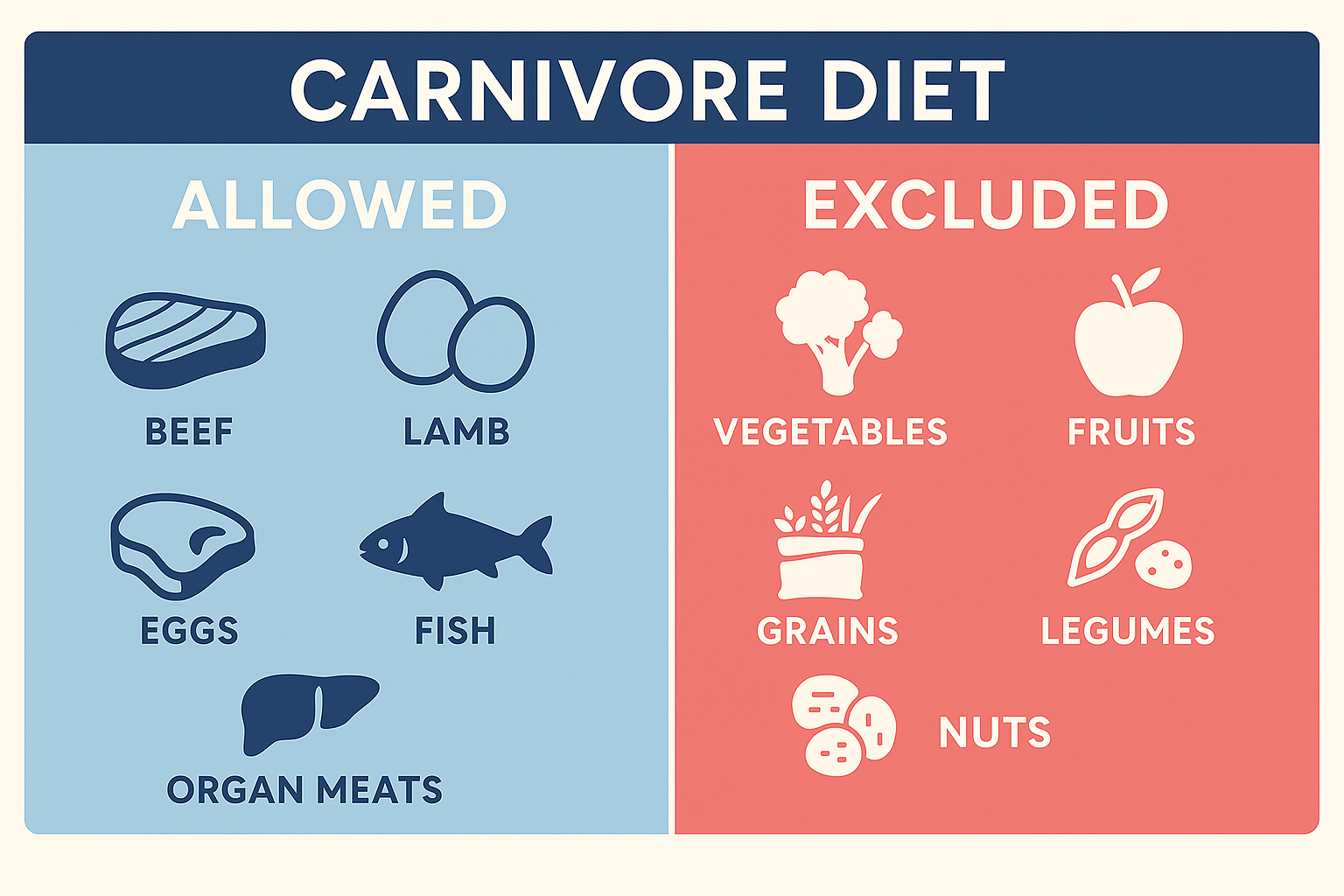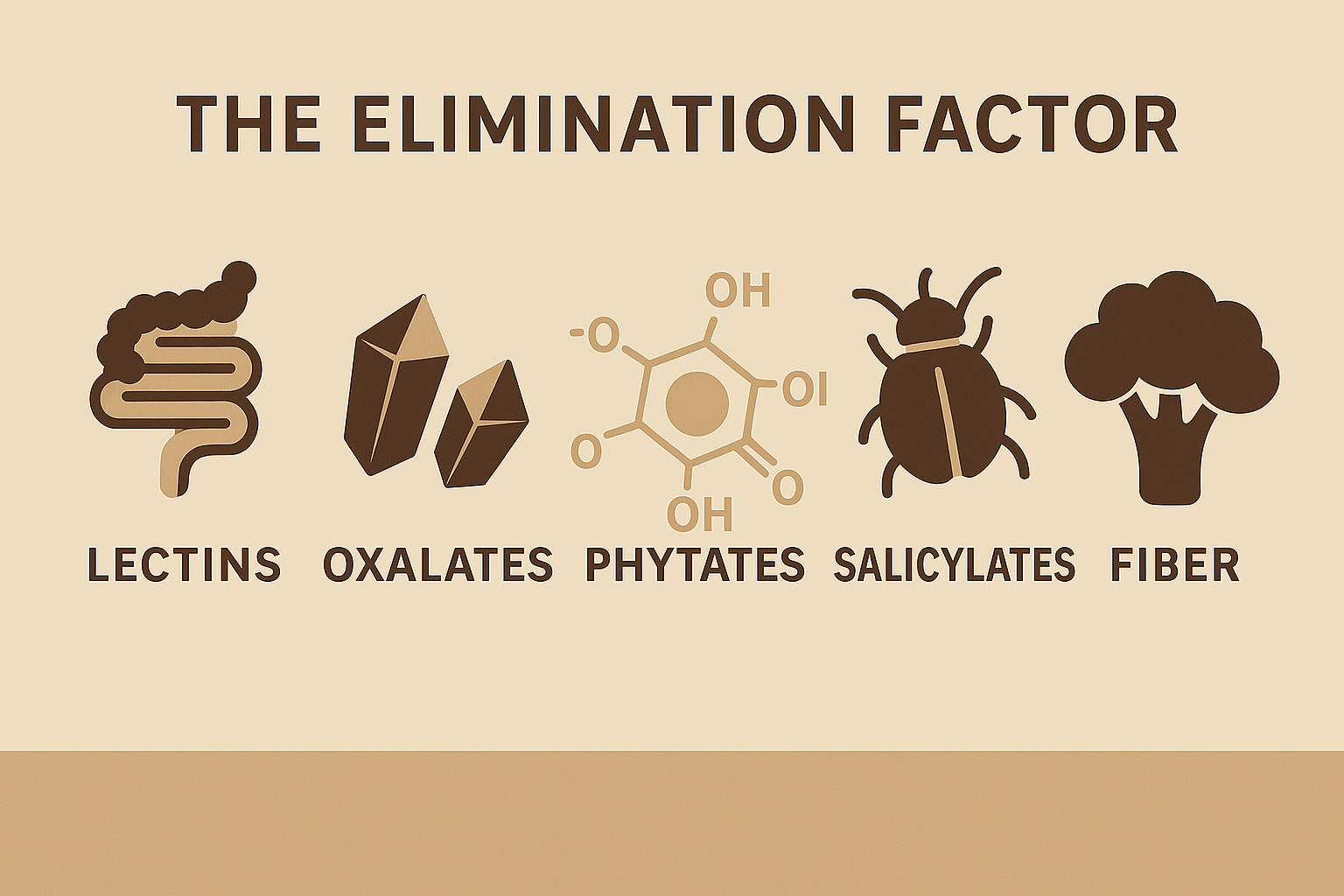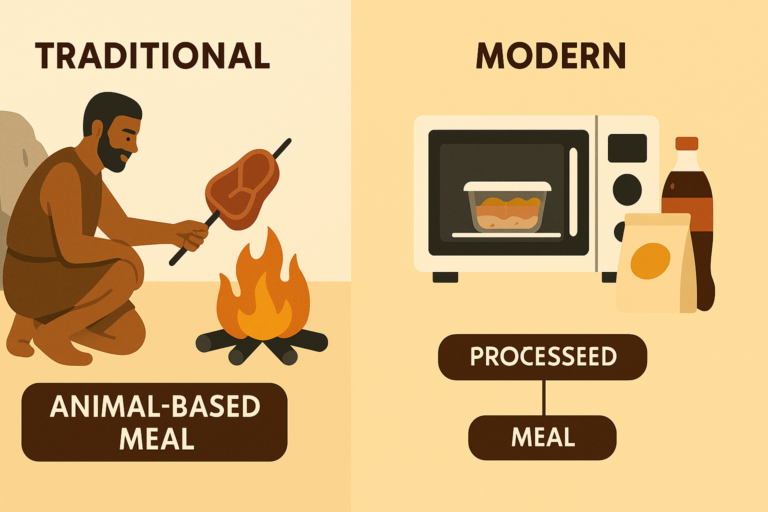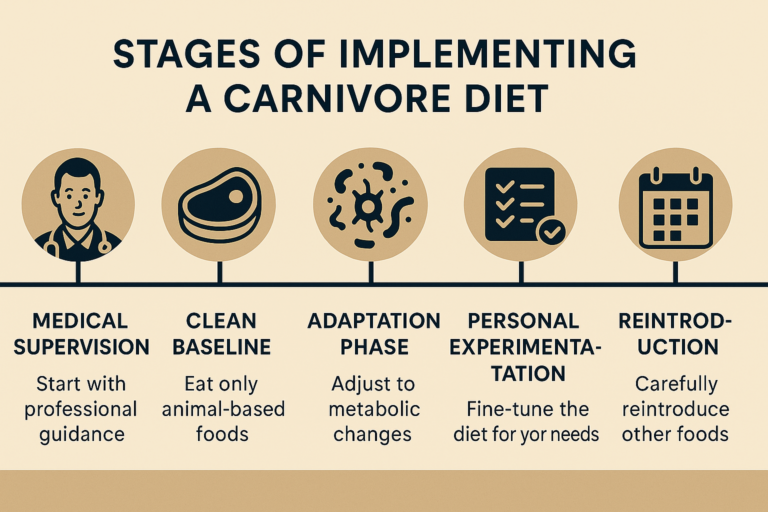What is the Carnivore Diet: Benefits, Risks, and Science Explained

Written by Scott Pringle, Founder of the Integrated Health Foundation
- Published on July 20th, 2025
- If you prefer not to read the article or have screen sensitivity, you may listen to this audio version

Table of Contents
- Understanding the Carnivore Diet
- The Science Behind the Carnivore Diet
- Potential Benefits of a Carnivore Diet
- Downsides and Risks to Consider
- Is the Carnivore Diet Safe?
- Who Might Benefit from a Carnivore Approach?
- How to Implement a Carnivore Diet Safely
- Common Questions About the Carnivore Diet
- Final Thoughts: Is the Carnivore Diet Right for You?
Understanding the Carnivore Diet
We’ve all had that uncle or coworker who ranted about how they get to eat bacon all the time, and they lost 20 pounds. Then there was that episode of The Biggest Loser—the weight loss reality show that had trainers encouraging clients to drink butter coffee to lose weight. Or maybe even you’ve been down this road before. Either way, we’re going to reveal some of the science behind how this is so beneficial to the human body and weed out some of the false concepts and even some dangerous practices circulating on the internet.
So, what is the carnivore diet? At its core, the carnivore diet is an all-animal-based eating plan that eliminates plant foods entirely. Often called a “zero-carb” approach, this diet focuses exclusively on meat, fish, eggs, and sometimes limited dairy products.
For those who are unfamiliar with this approach, you are unfortunately late to the game. This is not some new fad diet, even though it has gained traction in the last few years. This is a well-established eating protocol (for thousands of years), but in the early 1900s, it was so successful at healing chronic gastrointestinal diseases that a medical textbook was written using variations of it, and the doctors presenting the information were hailed as the greatest pediatrician and gastroenterologist of the century!
So while we aren’t going to be revealing a new idea, we will be uncovering a long-lost truth.
The carnivore diet takes elimination to its logical extreme, removing all plant foods, including vegetables, fruits, grains, legumes, nuts, and seeds. Basically, you’re the apex predator in a wilderness of grazing prey.
For many individuals struggling with chronic health conditions, particularly those affecting the nervous system, the carnivore diet represents an increasingly popular approach, even though it’s been done for decades successfully. You see, most of these carnivore protocols were originally ordered in doctors’ offices. The difference now is that, with social media, word has gotten to the public en masse, allowing individuals with certain illnesses to treat themselves and avoid the costs and time of a medical appointment.
Many chronic symptoms were diagnosed as psychosomatic. However, in the last decade, much has been revealed connecting the findings between the power of our thoughts and the diet we eat. Many patients report significant relief through dietary interventions like the carnivore diet.
The carnivore diet has gained attention in recent years as thousands of individuals share their stories through YouTube, Facebook, and the like, perhaps that’s even why you are reading this article now. You’ve likely seen the incredible stories of recovery, weight loss, and even reverse aging! Yes, decades are added to the lifespan, and youth returns in abundance.
From autoimmune disorders to digestive issues, the testimonials continue to accumulate, leaving many modern researchers and practitioners stunned. They were trained under a new protocol of pharmaceuticals, and long gone are the medical textbooks of the early 1900s proving dietary cures for severe illness. But it’s not that bleak, because even though we seemed to have lost some of that steam when it was derailed by the “fat” fear mongering, now thousands of doctors and practitioners have used the carnivore approach to heal their own ailments.

The Historical Context of the Carnivore Diet
Imagine you lived 1,000 years ago and it’s lunchtime. You certainly would not be pulling some lettuce, veggies, and chicken breast from your fridge and begin prepping a Caesar salad. Far from it! You’d be hunting, not staring into the fluorescent light of your fridge, wondering if some new treat has miraculously appeared since your last visit 10 minutes earlier.
Humans have relied heavily on animal foods throughout evolutionary history. Our ancestors were skilled hunters, and anthropological evidence suggests that many traditional societies thrived on predominantly animal-based diets. The Inuit of the Arctic regions, the Maasai of East Africa, and certain Native American tribes historically consumed diets exceedingly high in animal products with remarkably few plant foods when necessary.
We must understand that humans were limited to the restrictions of the seasons. This was a great protection, as we will discuss later regarding plant toxins. These traditional cultures demonstrated remarkable health despite (or perhaps because of) their animal-heavy diets, showing virtually none of the chronic diseases that plague modern society. Of course, their entire lifestyle differed dramatically from our sedentary, stress-filled modern existence, but their dietary patterns provide an interesting perspective on the potential compatibility between humans and animal-based nutrition.
The Science Behind the Carnivore Diet
With so much information at our fingertips, it can be confusing when most of it is conflicting. The carnivore diet challenges many conventional nutritional beliefs, particularly the idea that plant foods are essential for health. In reality, animal foods provide complete nutrition while eliminating potentially problematic plant compounds. Let’s examine the scientific foundation behind these claims.
Animal foods are nutritionally dense, containing complete proteins with all essential amino acids, bioavailable vitamins (including B12, which is absent in plant foods), and crucial minerals like zinc, iron, and selenium. Contrary to popular belief, many essential nutrients are more readily absorbed from animal sources than from plants due to the absence of anti-nutrients and the form in which these nutrients appear.
For example, the iron in meat (heme iron) is significantly more bioavailable than the non-heme iron found in plants. Similarly, the vitamin A in animal products comes as preformed retinol, whereas plants contain beta-carotene that must be converted by the body, a process that varies greatly in efficiency among individuals.
Another example is retinol, which is the animal form of Vitamin A, versus the plant form—beta-carotene. To convert beta-carotene (the plant form of vitamin A) into retinal (the active form used by the body), an enzyme called BCMO1 (beta-carotene monooxygenase 1) is required. However, up to 50% of people have a genetic variation in the BCMO1 gene that significantly reduces their ability to make this conversion efficiently. As a result, many individuals cannot rely on plant sources like carrots or sweet potatoes to meet their vitamin A needs. They require preformed, animal-based sources of vitamin A, such as liver, eggs, or cod liver oil, which provide the active forms (retinal or retinol) that the body can use immediately without conversion.
Chances are, you have a 50% likelihood of being deficient in this nutrient if you rely on plants. But a 100% chance of getting all you need when relying on animal products.
The Elimination Factor
Ever have a reaction to something you ate? Or perhaps you’re tired or have brain fog after a meal? One key mechanism behind the carnivore diet’s benefits is its function as the ultimate elimination diet. By removing all plant foods, it eliminates toxins:
- Lectins: Proteins found in many plants that can damage the intestinal lining
- Oxalates: Compounds that may contribute to kidney stones and joint pain
- Phytates: Anti-nutrients that bind to minerals, potentially reducing absorption
- Salicylates: Natural pesticides that some people react negatively to
- Fiber: While conventionally promoted as healthy, fiber can aggravate digestive issues in sensitive individuals
Many aren’t even aware that anti-nutrients exist. But for people with undiagnosed food sensitivities, autoimmune conditions, or dysregulated nervous systems, removing these compounds might reduce inflammation and allow the body to heal. This explains why many who’ve struggled with conventional treatments report improvement on a carnivore protocol.
It wasn’t until the last 60–80 years that refrigeration, global shipping, and preservation of plant foods became widespread. Before that, most people were limited to what was available in their region during their specific season. This was a protection—many plants are only available for a short period of time for a reason, and consuming high amounts year-round can lead to cumulative effects from plant toxins. There was no freezer truck bringing kale from Ecuador in January. These seasonal limitations protected us from overexposure to compounds our bodies may not tolerate well.

Potential Benefits of a Carnivore Diet
Who wouldn’t want a bright wand to reverse aging and the pain and limitations brought on by disease? Even though it sounds like a fairy tale, there is such a wand.
In just a few months, many individuals who adopt the carnivore diet report significant improvements in health markers and symptoms, particularly those related to chronic conditions. Here are some of the most commonly reported benefits:
Reduced Inflammation and Autoimmune Symptoms
Perhaps the most striking benefit reported by carnivore dieters is the reduction in inflammatory conditions. Numerous case studies and testimonials describe improvements in conditions like:
- Rheumatoid arthritis
- Psoriasis
- Inflammatory bowel disease
- Multiple sclerosis
- Hashimoto’s thyroiditis
- Nervous system dysregulation
Many practitioners around the world have used this approach for decades, and there are hundreds of thousands of case studies proving its efficacy. Emerging research suggests that eliminating plant anti-nutrients and focusing on animal-based nutrition helps regulate immune function in susceptible individuals.
Digestive Health Improvements
Going back to the early 1900s, we’ve revived the wisdom of true medical practitioners, and real, functional dietary healing has become available again. For those suffering from digestive disorders, the carnivore diet often provides substantial relief. By eliminating fermentable fibers and plant compounds that can irritate the gut, many experience:
- Reduced bloating and gas
- More regular bowel movements
- Less abdominal pain
- Improved nutrient absorption
The simplicity of the diet gives the digestive system a chance to rest and potentially heal from years of irritation.
Mental Clarity and Neurological Benefits
Where are my keys? What’s that word… or why can’t I problem-solve simple tasks? Brain fog is real, and we all can get it if our diet is off. One of the most frequently mentioned benefits is improved mental function and mood stability. Thousands report enhanced:
- Mental clarity and focus
- Reduced anxiety
- Improved depression symptoms
- Better sleep quality
- Stable energy throughout the day
These effects could be attributed to several mechanisms, including stable blood sugar, reduced inflammation affecting the brain, or changes in gut flora that influence the gut-brain axis.
Metabolic Health and Weight Management
Want to fit into that college dress or suit? Many adopt the carnivore diet for its effects on metabolic health, reporting:
- Effortless weight loss
- Improved insulin sensitivity
- Better blood glucose control
- Normalized blood pressure
- Enhanced lipid profiles (despite the high saturated fat intake)
These outcomes challenge conventional thinking about diet and heart health, suggesting that the metabolic effects of animal-based nutrition might be more complex than previously understood.
Downsides and Risks to Consider
What are the downsides of a carnivore diet? Despite the potential benefits, this approach comes with legitimate concerns that shouldn’t be dismissed. Understanding these risks is essential for anyone considering this radical dietary change.
Nutritional Considerations
While animal foods are nutrient-dense, eliminating all plant foods raises questions about certain nutrients:
- Vitamin C: Though present in fresh meat (especially organ meats) in small amounts, levels are lower than in plant foods. However, if you utilize organs properly, this won’t be an issue. So just make sure you know where it is and how to get it.
- Fiber: Conventional wisdom holds that fiber is essential for gut health, though carnivore proponents challenge this belief—and with good reason. We will explain more in our article on ketosis, where we blow this ridiculous lie to smithereens. But in the meantime, understand that anyone pushing fiber while you’re on carnivore is selling something. You. Don’t. Need. It. So don’t get lost in supplements.
- Phytonutrients: Plant compounds with potential health benefits are absent. So what do we do about this? Again, in our ketosis article, we will help you understand the powerful ways to access what you need. However, when a carnivore is eaten the proper way, there is no need to stress over berries and nuts.
- Prebiotic fibers: These feed beneficial gut bacteria, raising questions about long-term microbiome health. But do you really need to mix some fiber into your coffee to carnivore? These are all outdated bumper stickers on a broken-down van by the river.
Social and Practical Challenges
Beyond nutritional concerns, the carnivore diet presents practical challenges:
- Social dining becomes more complicated—unless you simply plan ahead. It’s called adulting, and we all should know how to do it.
- Food preparation may require more time, but it’s also simpler and easier to put together. In many cases, the time requirement evens out.
- The cost of high-quality animal products can be substantial. Yet when you factor in the money saved by reducing purchases for other foods, again, it equals out.
- The diet can be monotonous for some people, so make sure you find a book or social media guru to keep it interesting.

Is the Carnivore Diet Safe?
Is a carnivore diet safe? Well, the short answer is—if it wasn’t, none of us would be here. Because this is how human beings ate for thousands of years. Dr. Weston A. Price did extensive work on this as he traveled the world comparing the health of animal-based diets among rural tribal people and that of Western populations. It appears the real risk is in how Westerners eat today, and whether their lifestyle can sustain it.
Many physicians who work with carnivore patients report seeing improvements rather than deterioration in health markers, including:
- Improved inflammatory markers
- Better blood glucose regulation
- Normalized blood pressure
- Surprisingly improved lipid profiles
That said, it’s not a blanket recommendation. While most healthy individuals seem to tolerate the diet well, there are some situations where caution is advised:
When Extra Caution is Needed:
- Pregnant or breastfeeding women: Nutrient needs are higher during these periods and may not be met without careful planning.
- Children and adolescents: Still-developing bodies may require a broader spectrum of nutrients.
- People with kidney disease: Higher protein intake may not be appropriate without medical supervision.
- Genetic/metabolic conditions: Always speak with a knowledgeable provider before making a drastic dietary change.
Ultimately, like with any medical protocol, the answer is: it depends. But if done correctly—with organ meats, proper hydration, and adaptation time—it’s more than just safe. It might be the most ancestrally aligned diet out there.
Who Might Benefit from a Carnivore Approach?
Everyone. I know, I’m probably partial—but the real science here is in the history and health of our ancestors. Believe those who actually lived it.
That said, some groups consistently see remarkable transformations when adopting a carnivore protocol. Here’s who might especially benefit:
Individuals with Autoimmune Conditions
Those suffering from autoimmune disorders often experience significant symptom improvement on a carnivore protocol. The elimination of potential trigger foods and reduction in dietary antigens may help regulate an overactive immune response.
People with Digestive Disorders
If you’ve been battling IBS, Crohn’s, ulcerative colitis, or SIBO, you’re probably exhausted. The removal of fermentable fibers and plant irritants gives the digestive system a much-needed break, often leading to massive symptom relief.
Those with Food Sensitivities
For people reacting to “everything,” carnivore offers a clean slate. After a baseline is established, reintroductions can help you pinpoint specific triggers with confidence, rather than guessing through food journals and elimination roulette.
Patients with Dysregulated Nervous Systems
Perhaps most relevant to the Integrated Health Foundation’s mission—those with:
- POTS (Postural Orthostatic Tachycardia Syndrome)
- Dysautonomia
- Chronic Fatigue Syndrome
- Fibromyalgia
- Multiple chemical sensitivities
These individuals often report reduced symptom severity and frequency. The carnivore diet, rich in brain-supportive nutrients and absent of inflammatory plant compounds, may support nervous system regulation and deeper healing.
How to Implement a Carnivore Diet Safely
So now you’re excited to go chomp on that steak and bacon. If you’re considering trying the carnivore diet, especially to address chronic health issues, here’s how to approach it thoughtfully:
Medical Supervision is Essential
Always work with healthcare providers who:
- Are knowledgeable about dietary interventions
- Will monitor your bloodwork regularly
- Understand your specific health conditions
- Support your self-experimentation while providing safety guardrails
Start with a Clean Baseline
Begin with the simplest version of the diet:
- Focus on ruminant meats (beef, lamb)
- Include some organ meats for micronutrient density—this IS ESSENTIAL! If you don’t eat the whole animal, you can’t expect the whole benefit from carnivore.
- Stay well-hydrated
Electrolytes like sodium, potassium, and magnesium might be needed, especially in the early days.
The Adaptation Phase
Be prepared for an adjustment period:
- The initial 2–4 weeks often involve temporary side effects as your body adapts
- Huge microbiome shifts occur, and it can be very difficult for many initially
- Common experiences include fatigue, digestive changes, and cravings
But persevere—and you will be astounded by what happens.
Personal Experimentation
After establishing a baseline, you can personalize your approach:
- Some do better with more fat, others with leaner cuts
- Certain individuals tolerate small amounts of dairy, while others don’t
- Organ meat inclusion varies based on individual needs and preferences
Reintroduction Testing
For many, the carnivore diet serves as a powerful elimination protocol:
- After 30–90 days of strict carnivore eating, systematic food reintroductions can identify specific triggers
- This personalized approach helps create a sustainable, long-term diet that minimizes problematic foods

Common Questions About the Carnivore Diet
It depends on your context. If you’ve been living with chronic illness, autoimmune flare-ups, or unexplained fatigue, then yes, many people have found it to be a health-restoring miracle. If you’re generally healthy and just curious? It still might give you insight into how different foods affect your energy, mood, and digestion. It’s not about dogma—it’s about data from your own body.
- Eliminates inflammatory triggers
- Simplifies food choices (less decision fatigue)
- Delivers high nutrient density and bioavailability
- Keeps blood sugar stable
- Reduces cravings
- Often improves autoimmune and digestive symptoms
- Mental clarity? Through the roof.
Quality matters. Your foundation should be:
- Grass-fed and finished beef, lamb, or bison
- Organ meats (liver, heart, kidney)
- Wild-caught seafood
- Eggs (if tolerated)
- Poultry can be included, but it isn’t the star of the show when it comes to fats and micronutrients.
It depends. Here’s what most people find helpful:
- Electrolytes (especially sodium, potassium, and magnesium during transition)
- Vitamin C isn’t always needed, but small amounts help some
- Organ meat supplements if you’re not eating the real thing
You’ll know if you need something. Track how you feel. Trust how you feel.
Final Thoughts: Is the Carnivore Diet Right for You?
The carnivore diet isn’t a fad—it’s a return. A return to something deeply human, deeply healing, and honestly, deeply logical. It strips away the fluff, the noise, and the processed chaos we’ve been sold for decades and asks: What if simplicity is the solution?
For some, it’s the missing piece they’ve been searching for—especially those who’ve felt ignored or dismissed by modern medicine. For others, it becomes a season of reset, a lens through which to better understand their body’s signals.
At the Integrated Health Foundation, we don’t push one-size-fits-all answers. We support people in taking ownership of their health and building from a place of clarity. Carnivore isn’t magic. But it is powerful. It’s worth your curiosity. It’s worth a test drive.
If you’re struggling with unexplained symptoms, digestive issues, autoimmune conditions, or nervous system dysregulation, consider this your invitation. Not a prescription. An opportunity.
And hey, maybe you’ll just finally feel good again. That’s reason enough.
Ready to discover whether your symptoms might be connected to your diet or a dysregulated nervous system? Take our free Symptoms Evaluation Assessment today and gain insights into your unique health situation:
Evaluate Your Symptoms: Do You Have Dysautonomia?
Take our quick and comprehensive symptom assessment to find out if your symptoms align with dysautonomia and receive personalized insights.
Share This Article
Read More Articles

Is Your Nervous System Overmedicated or Under supported?
Calm your overactive nervous system naturally: root causes, real healing tools & steps to feel safe again. Take our free assessment today!

What is a Dysregulated Nervous System?
Discover what a dysregulated nervous system is, explore symptoms & recovery options, and take our free Symptoms Assessment today!
What treatment options are available for dysautonomia?
Dysautonomia is a condition where there is a dysfunction in the autonomic nervous system (ANS) which controls unconscious body functions such as breathing, blood pressure,

